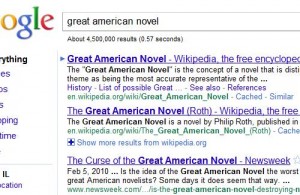Last week the New York Times posted an insightful overview of an important debate: are blogs becoming less relevant?
Blogs Wane as the Young Drift to Sites Like Twitter
If you’re a writer, you hopefully know that you need an online presence in order to market your book in today’s increasingly electronic marketplace. You hopefully know what a blog is, and also what is meant by the term “social network.” If you don’t know these things, you’re far behind in the game. 
Now: Obviously I think blogs are a powerful tool for writers to use to promote themselves. After all, I spend hours each week maintaining this blog. And yet, every critique of blogs made in the Times article is pertinent. Even with the convenience of aggregators and RSS feeds, blogs seem “out on their own,” disconnected from the hundreds of millions of users on Facebook or Twitter. As Susan Rosenstock says in the article: “Blogging can be a very lonely occupation; you write out into the abyss.”
Like all aspects of online marketing, blogs can be effective but only if you understand the evolving role of the technology and use it appropriately. Nothing online works blindly.
Firstoff, the article qualifies almost every point that it makes. Blogging is down among the younger demographic, but it is only down minimally across the whole population. Platforms which have stayed on top of the technology curve (especially WordPress) haven’t suffered in particular. Also, blogging is “down” because conversation have migrated to social networks, not because conversations are no longer taking place. Significantly, if you scan, for example, your Facebook feed and look at your friends’ postings, many will be links. And a significant number of those links will lead to blogs. So the answer isn’t that “blogs are good” or “blogs are bad” or even “blogs were good but now they’re not,” but that you can’t use blogs or any social media without understanding their changing relationship to each other.
Building on this: Blogs can do things which social networks cannot do. Not yet. We might consider the three most popular forms of social media to be social networks (ie. communities of “friends” like Facebook), microbloggers (ie. succinct headline reporting like Twitter), and social aggregators (ie. Digg, Delicious, Reddit). Each of these platforms have pros and cons. Significantly, the major cons of all three groups are mitigated by blogs:
A social network does not allow for fully public encounters, and to the extent that content is public, it is still bound by hardwired restrictions in the network itself. This is not true of blogs.
A microblogger does not encourage a detailed, nuanced argument or allow a subject to be easily engaged in breadth or depth. This is not true of blogs.
A social news / bookmarking platform (there are many and their functions overlap considerably) are not conducive to straightforward self-promotion. This is not true of blogs.
What is true of these sites is that they all provide access to huge numbers of people, and hence, opportunities to build connections. Some of those connections will be interested in your blog. In the Times article, when Toni Schneider says that “anyone who is taking blogging seriously [is] using several mediums to get a large amount of their traffic,” he means that they’re generating traffic through Twitter, Facebook, etc. That’s one way to avoid writing into the abyss. (Note: This entry will shortly be promoted on seven social media sites.)
But if you can use social media to drive traffic to your blog, maintaining the blog itself is still a major undertaking. It is not equivalent to book sales, or reviews, or any other positive coverage. What can blogging itself accomplish for your writing?
That’s a topic I’ll tackle tomorrow.
But for now, present and future bloggers should rest assured. You’re not in the junk heap of the internet. Your work still has value. And you should keep it up.
